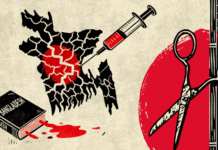Muddling our way through murder

We vilify some killers, but defend others
I have written the following from the perspective of one who observes social interactions and social discourse, and do feel free to disagree, as I would welcome debate on the issues raised.
On October 7, Abrar Fahad, a second-year student of the electrical and electronic engineering department of the prestigious Bangladesh University of Engineering and Technology (BUET) was tortured and killed by Chhatra League leaders inside the Sher-e-Bangla Hall. It was a premeditated act, and thus far the motive for the murder is a Facebook post, but the investigation is still under way, and there may be other findings which I am unaware of.
On the morning of October 9, I set out to visit Dhaka Central Jail in Old Town, and en route I witnessed sporadic protests against the killing of Abrar. As I reached Nizamuddin Road, I thought how interesting, to have the prison smack in the middle of the hustle and bustle of shops and restaurants; not just any restaurants mind you, but the superbly delicious biriyani houses.
I was comforted realizing that we do not isolate our prisoners, our killers, as in they are in confinement, but not necessarily sequestered (for lack of a better word). And then, as I walked around the deserted premises of the jail — the building where Bangabandhu was imprisoned, the rooms where the four leaders were assassinated on Jail Killing Day, the cells where the prisoners who received the death sentence passed their last days, and the gallows itself — I began to wonder about our society’s attitudes towards premeditated murder.
Abrar’s death “sparked outrage” and there is still much talk regarding the “culture of impunity,” that if one is well connected, one can get away with murder literally. Rewind our political history to 1975 as manifested in the jail premises — legally, and certainly through loopholes, trials have been eluded and convictions have been prevented.
And the known to be killers and self-confessed murderers were not socially ostracized either. My personal view is that in all likelihood, there is more shame attached to not having money or losing one’s status than there is in being associated with taking a life. But then again, I am a cynic who upholds the view that class intersects with crime and euphemizes killing to suit the hegemony.
I wonder if there is any connection between the “culture of impunity” and the degrees of shame associated with deliberately taking another person’s life? If premeditated murder is the most shameful of acts, most heinous of crimes, most unforgivable of undertakings, as it is with Abrar’s life, then should we not extend our outrage to all planned murders, not simply the ones on campuses? Let us say, all premeditated killings since the War of Independence and the inception of Bangladesh.
If Abrar’s family deserve their day in court by due process, then do not all the victims of the war deserve justice? Yet, why do some of us then question the necessity of the war crimes trials? Why do we say let sleeping dogs lie, why bring up the past, let bygones be bygones? Is our selective outrage fair to those families?
If Abrar is a concerned citizen allowed to voice his opinions on social media, then should the atheist bloggers not be allowed freedom of speech? Some of us thought their mangled dead bodies were not precious enough to make a hue and cry about. Does that imply that we choose which murders are worthy of contempt and which are justifiable?
If Abrar’s killers are the “scourge of society,” then the boys who massacred innocent victims at the Holey Artisan, must be dregs too, must they not? Why then do we sympathize with the distraught parents of those boys (the Holey murderers) and say they must be pitied for losing their sons for going astray, and yet we are loathe to say the same for the parents of those who took Abrar’s life?
Let’s face it: We defend certain assassins, while we vilify other executioners, and I am sorry to say that our attitudes are inconsistent when it comes to premeditated murder and its architects and perpetrators, and our reactions are contradictory.
It is because we are continuously altering our perspectives to adjust to our ambivalence, that the parameters of planned killing keep shifting. We as citizens ourselves are to blame for the “culture of impunity” that we allegedly abhor, as we cannot address our own double standards.
Let us hold these thoughts as we pray for Abrar and his family and chorus for justice.
Fariha PH holds a MA in Human Rights and International Relations, and an MA in Psychosocial Studies, and is a regular contributor to Dhaka Tribune.









